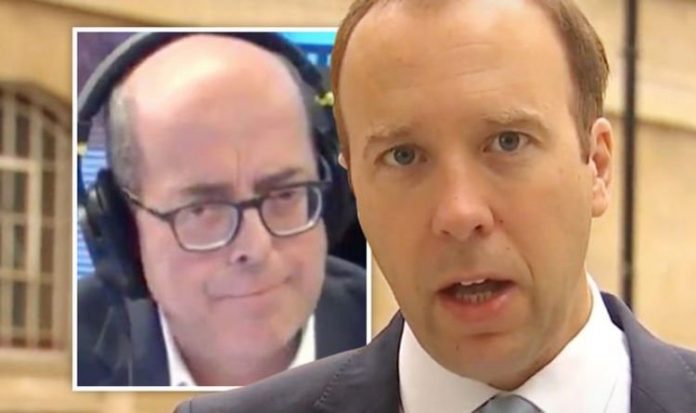BBC Radio 4 host Nick Robinson challenged Matt Hancock over the Government’s “confusing” coronavirus policies arguing directives to British people have often contradicted themselves in a matter of hours, making it difficult for the British public to trust and follow instructions. He said: “If you live in Bolton and Trafford, one minute you’re told the lockdown will be lifted, the next minute you’re told the Government has changed its mind.
“One moment you ignore local council leaders and listen to Tory MPs, the second time you listen to local council leaders.
“Why is it so difficult to get clarity from the Government about what it’s doing?”
But the BBC host’s accusation was promptly rebuked by Mr Hancock who snapped: “We give absolute clarity and then the facts change. In the space of days.
“Take Bolton – we did take the decision to take Bolton out of the lockdown because its case rate had gone down to around 17 cases per 100,000. It then had the biggest rise of anywhere in the country and now has one of the biggest rates because of a major outbreak in Bolton and I therefore took the decision not to lift the lockdown measures in Bolton.
READ MORE: Coronavirus: Drug reduces risk of death for critically ill by 20%
“Bolton council were in favour of lifting the measures and then in favour of not doing.
“When the facts change, Nick, I have to change the decision.
“What would you do?”
The Health Secretary also defended the Government’s coronavirus strategy in an earlier interview on Sky News.
Hitting back at Kay Burley, he claimed the Government’s coronavirus testing system is working “well” after suggestions that people are being directed to centres more than 100 miles away.
Hancock said there are “operational challenges from time to time” with the regime, after a postcode analysis by the BBC showed some people are being told the closest available tests are hours from home.
The broadcaster said this shows the Government is rationing tests, while public health experts believe any restrictions will lead to the start of new spikes being missed.
Mr Hancock told Sky News: “At the moment the system works well. Of course there are operational challenges from time to time but it works well.
“And we’re finding a higher and higher proportion of people in the country who have coronavirus and getting them tests so they can be looked after.
“But absolutely, we need to roll out more testing – we have done throughout this crisis and today’s another step in solving some of those problems with the existing technology.”
DON’T MISS:
Hitting workers with ANY petrol tax rise will KILL recovery [COMMENT]
Boris Johnson leadership rival says he ‘dodged a bullet’ by losing [ANALYSIS]
Coronavirus map LIVE: 36% surge in patients on ventilators in 4 days [LIVE BLOG]
He said the issue was part of the reason why the Government was investing in trials of quicker COVID-19 tests.
On Thursday, the Government committed to a £500 million support package for 20-minute tests and efforts to explore the benefits of repeat testing.
The money will go towards expanding trials of the speedy no-swab saliva test in Southampton and elsewhere in Hampshire, and launching a repeat testing trial in Salford, Greater Manchester.
One professor believes this change should have been made over the summer when the country was “relatively COVID-secure”.
Professor Alan McNally, from the University of Birmingham, told Radio 4’s Today programme: “I don’t think the time is right. I think the time was right to think about scaling up testing to the wider community and asymptomatic testing over the summer when we were relatively COVID-secure, knowing that autumn and winter would come.
“Ideally we would be far more advanced in our ability to handle what we’re already beginning to see, an increase in requirement for COVID testing and respiratory infection testing.”







